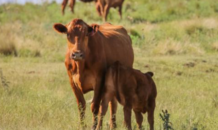Bartholomew has given his time to 4-H shooting sports for two decades
MANHATTAN, Kan. – Ray Bartholomew, who has volunteered for the Kansas 4-H and Youth Development’s shooting sports program for the past 20 years, has been named a Friend of Extension by the national chapter of Epsilon Sigma Phi.
Bartholomew has served as the state volunteer coordinator for Kansas 4-H Shooting Sports for the past 10 years. On average, he spends about 20 hours per week helping to recruit and train other volunteers to become certified shooting sports coordinators in the state.
In 2015, Bartholomew logged more than 1,040 volunteer hours with Kansas 4-H, an equivalent value of $22,505.60 to the youth development program.
Kansas 4-H reports that there are approximately 3,516 youth who participated in shooting sports in the past year, the third highest enrollment among the organization’s three dozen statewide programs.
Receiving the Friend of Extension award “is gratifying, it’s also humbling,” Bartholomew said. “I look at extension as being a family. Since I’m not a paid employee, I look at it like I’m an adopted child of extension. I very much appreciate this honor.”
Sigma Epsilon Phi is an association of county extension agents and specialists. Each year, Kansas honors one or more individuals for the work they have done on behalf of extension.
“Ray is very deserving,” said Pam Van Horn, an extension specialist for Kansas 4-H and Youth Development. “The shooting sports program would not be where it is at today without his dedication to training others.”
Van Horn notes that Bartholomew’s leadership is key to the nearly 525 certified adult volunteers who have been trained to teach shooting sports in Kansas. They represent 70 extension units in the state, and have contributed more than 49,000 hours toward the sport, according to figures from the state 4-H office.
That volunteer time is equivalent to approximately $1.06 million in service to youth and the state of Kansas, Van Horn said.
“For me, it’s a passion,” said Bartholomew, who credits his own time in 4-H for teaching him leadership and commitment to service. “I get to do something I enjoy doing and pass on those opportunities to work with firearms, work with archery equipment, and to do it safely.”
Bartholomew is state certified in six disciplines (archery, coordinator, hunting skills, pistol, rifle and western heritage/cowboy action), and nationally-certified in archery and as a program coordinator.
“We are trying to teach kids how to do something appropriately with equipment that in our culture isn’t always used appropriately,” Bartholomew said. “We want to get to them early, particularly in 4-H, so that they understand that we don’t point the gun at people and we don’t point at images of people. We teach them how to use this equipment in an appropriate manner, shooting paper targets, and in some cases where they want to go out and hunt, being able to do that responsibly.”
He adds: “The rewards are seeing those kids, seeing those adults doing something that I have a passion for. Since I have a passion for it, it allows me to do something where it’s not my paid job, I get to do what I like to do, and extension provides the platform for the opportunity.”
Van Horn noted that the Kansas shooting sports program has increased its enrollment by 3 to 4 percent over the past five years.
Bartholomew is a farm loan manager for the U.S. Department of Agriculture’s Farm Service Agency in Hutchinson. He recently served on the Kansas Extension Advisory Council and also serves on the Reno County Extension Board as treasurer, and is a member of the 4-H Program Development Committee.
Van Horn said he is active in helping educate 4-H volunteers about the greater mission of K-State Research and Extension.
“Kansas 4-H is honored to have him serve in its ranks,” she said.
K‑State Research and Extension is a short name for the Kansas State University Agricultural Experiment Station and Cooperative Extension Service, a program designed to generate and distribute useful knowledge for the well‑being of Kansans. Supported by county, state, federal and private funds, the program has county Extension offices, experiment fields, area Extension offices and regional research centers statewide. Its headquarters is on the K‑State campus in Manhattan.
Story by:
Pat Melgares
melgares@ksu.edu
K-State Research and Extension
www.ksre.ksu.edu




